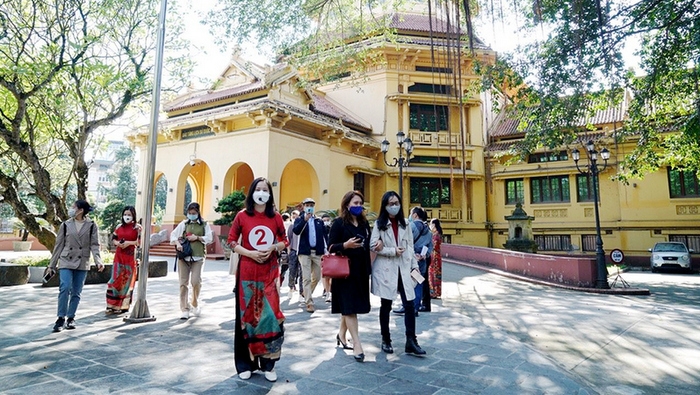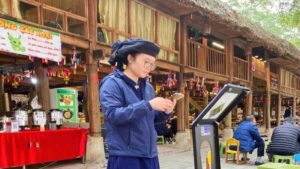The prolonged impact of the COVID-19 pandemic has significantly changed the consumption habits of customers in all aspects, including tourism.

Visitors joining a tour to explore French architectural works in Hanoi. (Photo: Thuy Ha)
In addition to requirements of experience, visitors are particularly interested in the safety during their journeys. To meet this demand, "contactless travel” has been considered a solution as well as an appropriate direction to help tourism develop flexibly and adapt to the pandemic.
“Contactless travel” can be understood as a form of tourism towards providing services that help minimise direct contact among people to limit the risk of infection while still ensuring the products’ quality and not affecting the tourists’ experiences. Previously, all activities of ordering and using services as well as carrying out travel procedures needed the direct work with officials and employees from relevant units. However, “contactless tourism” will help these processes operate smoothly thanks to automation technology. At the airport, passengers can check-in automatically, get e-tickets, check in luggage online and make online customs declarations at e-kiosks.
These solutions not only help to save time for passengers but also maintain safety for passengers because they no longer have to queue to check in or worry about the risk of losing documents. At the hotel, instead of directly checking in, checking out and looking for travel itinerary advice directly at the front desk, guests can pick up and return the keys by themselves and turn on the equipment in their rooms via automatic technology and facial recognition features.
Over the past years, many travel businesses have actively accelerated digital transformation and the use of technological advances in the introduction of their products and supporting visitors to find out information, order and pay for tours online. A number of online travel platforms have been formed, allowing users to purchase packaged tours, air tickets and hotel rooms via online transactions.
In order to improve the ability to meet the tourists’ demand amid the pandemic, potential corporations and businesses have also planned to invest in new technologies. Vietnam Airlines has developed a contactless check-in service for travelers via its website, mobile application and automated kiosk system.
SunGroup has researched the implementation of touchless technology in welcoming visitors. Meanwhile, Vinpearl has cooperated with VinBigdata Institute to launch the Smart Butler app that allows guests to give voice orders when they want to find out information about restaurants and amusement parks. The first "touchless hotel" chain named SOJO Hotels has appeared in Vietnam, providing guests with fully automated experiences, including receiving keys, opening rooms, turning on equipment and customising temperature and lights, through smartphone apps, creating a safe and convenient model amid the pandemic.
Along with speeding up technological apps in providing tourism services, some travel agencies have actively built new tourism products towards contactless and self-contained operation such as caravan tours by self-driving cars, cycling tours to explore the destinations, and tours to French architectural works inside Hanoi. These are good signs showing the active participation of tourism agencies in the new normal.
The development of “contactless travel” during the pandemic has continued to prove that digital transformation is the future of travel. To keep up with the trend and not lose the competitive advantage in tourism, businesses should pay great attention and give appropriate investment in technology. This process needs the companionship, support and facilitation from the authorities, especially when the majority of tourism businesses in Vietnam have small and medium sizes. However, due to mobilising the strengths of automation, “contactless travel” is still not really friendly for disadvantaged people who have difficulty in using technology such as people with disabilities or the elderly. It is crucial to have more research to help “contactless travel” in reaching more people.
Viet AnhTranslated by NDO
















